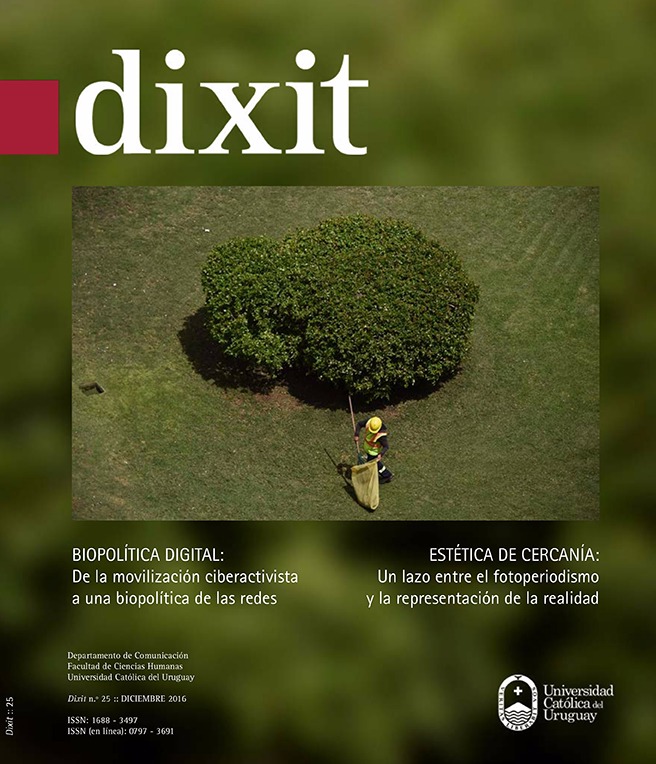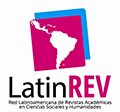From ciberactivist mobilization to a biopolitic in digital networks
DOI:
https://doi.org/10.22235/d.v0i25.1269Keywords:
cyberactivism, biopolitics, digital networks, social movements, strategiesAbstract
This article proposes the subsumption of the concept of ‘cyberactivism’ —which is reduced to the strategic use of digital technologies for political mobilizations— in that of ‘digital biopolitics’ understood as incessant production of the common, in and through networks. In order to operate this conceptual displacement, the main concepts of cyberactivism are discussed and it is argued that, although these visions help to understand how the networks facilitated the emergence of a general culture of mobilization, they do not problematize the possibilities of catching the mobilizations own network, nor the existence of a digital activism of a reproductive/conservative nature. Thus, this paper presents the idea of a digital biopolitics to think of manifestations —provoked by events— as possibilities that emerge from an immanent process of production of the common in the networks. To support this idea, the strategies of two Brazilian social movements are analyzed.
Downloads
References
Aguiar, L. (2010). Comunicação e Ecologia da Mente: possíveis articulações entre crise ambiental e produção de subjetividade. Semiosfera, 10, 01-15.
Bentes, I. (2013). Prefácio. Nós somos a rede social. Malini, F. y Antoun, H. A internet e a rua: ciberativismo e mobilização nas redes sociais(pp. 9-16). Porto Alegre: Sulina.
Castells, M. (2013). Redes de indignação e esperança: movimentos sociais na era da internet (C. A. Medeiros, Trad.). Río de Janeiro: Jorge Zahar.
Cocco, G. (2009). MundoBraz: o devir-Brasil do mundo e o devir-mundo do Brasil. Rio de Janeiro: Record.
Da Silveira, S. (2012). Redes cibernéticas e a reconfiguração da biopolítica. Cocco, G. Y Abbagli, S. (Orgs.). Revolução 2.0 - e a crise do capitalismo global (pp. 281-292). Rio de Janeiro: Garamond.
Da Silveira, S., Braga, S. y Penteado, C. (2014). Cultura, política e ativismo nas redes digitais. San Pablo: Fundação Perseu Abramo.
Deleuze, G. (2015). O que é um dispositivo?. Escola Nômade de Filosofia. Recuperado de http://escolanomade.org/2016/02/24/deleuze-o-que-e-um-dispositivo/
Fairclough, N. (2001). Discurso e mudança social. Brasilia: Universidade de Brasília.
Fairclough, N. (2003). Analysing discourse: textual analysis for social research. Londres/Nueva York: Routledge.
Malini, F. y Antoun, H. (2013). A internet e a rua: ciberativismo e mobilização nas redes sociais. Porto Alegre: Sulina.
Martin, J. R. y White, P. R. R. (2005). The language of evaluation: appraisal in English. Londres: Palgrave.
Morozov, E. (2011). L’ingenuità della rete. Il lato oscuro della libertà di internet (M. Renda, Trad.). Turín: Codice.
Negri, A. (1993). A anomalia selvagem. Poder e potência em Spinoza (R. Ramalhete, Trad.). San Pablo: Editora 34.
Negri, A. (2004). Para uma definição ontológica da multidão. Lugar comum, 19-20, 15-26.
Negri, A. (2005). A constituição do comum. Presentado en el II Seminario Internacional Capitalismo Cognitivo – Economia do Conhecimento e a Constituição do Comum. Rio de Janeiro, Brasil.
Negri, A. y Hardt, M. (2005). Multidão. Guerra e democracia na era do Império (C. Marques, Trad.). Rio de Janeiro: Record.
Negri, A. y Hardt, M. (2010). A produção biopolítica. Parente, A. (Org.). Tramas de rede: novas dimensões filosóficas, estéticas e políticas da comunicação (pp. 161-173). Porto Alegre: Sulina.
Padilla, M. (2012). El kit de la lucha en Internet. Madrid: Traficantes de Sueños.
Rüdiger, F. (2011). As teorias da cibercultura. Perspectivas, questões e autores. Porto Alegre: Sulina.
Vem pra rua. (s. f.). Sobre nos. Recuperado de http://www.vemprarua.net/sobre-nos
Downloads
Published
How to Cite
Issue
Section
License
From issue number 32 onwards all contents are licensed under the Creative Commons Attribution 4.0 International License (CC BY 4.0).
Issues number 29-31 are licensed under the Creative Commons Attribution-NonCommercial 4.0 International License.
The contents corresponding to number 28 and earlier editions are under the Creative Commons Attribution-NonCommercial-ShareAlike 4.0 International License.


















